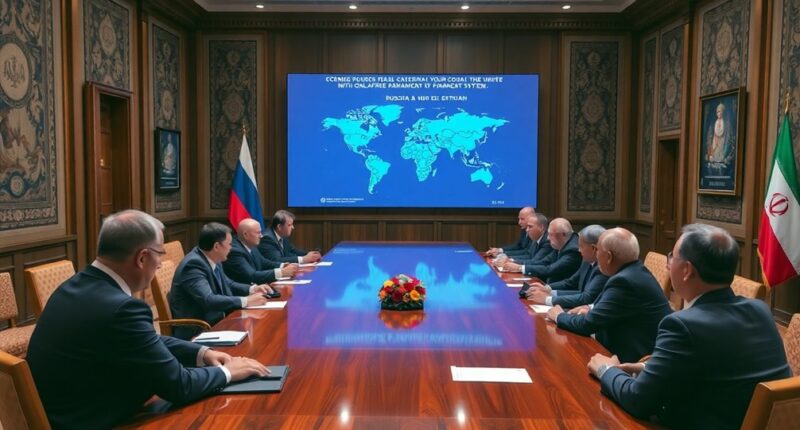Russia and Iran are teaming up to create a new payment system that aims to replace SWIFT. This financial alliance links their banking infrastructures, allowing direct transactions without relying on Western systems. The involvement of both countries' central banks ensures compliance, while nearly 700 Russian banks and over 100 foreign banks are set to join. With additional enhancements for cross-border transactions and the introduction of a gold-backed cryptocurrency, this partnership is designed to bolster economic resilience amid sanctions. If you're curious about the implications and more details of this initiative, there's plenty more to uncover.
Key Takeaways
- Russia and Iran are forming a financial alliance to establish a new payment system that bypasses SWIFT amid increasing Western sanctions.
- The agreement links the national payment infrastructures of both countries, enabling direct transactions without relying on traditional banking systems.
- Approximately 700 Russian banks and 106 foreign banks from 13 countries will be connected to facilitate cross-border trade.
- The development includes a gold-backed cryptocurrency aimed at challenging the dominance of the US dollar in international trade.
- Enhancements in interbank communication and utilization of the SPFS system will streamline cross-border transactions between Iran and Russia.
New Financial Alliance Emerging
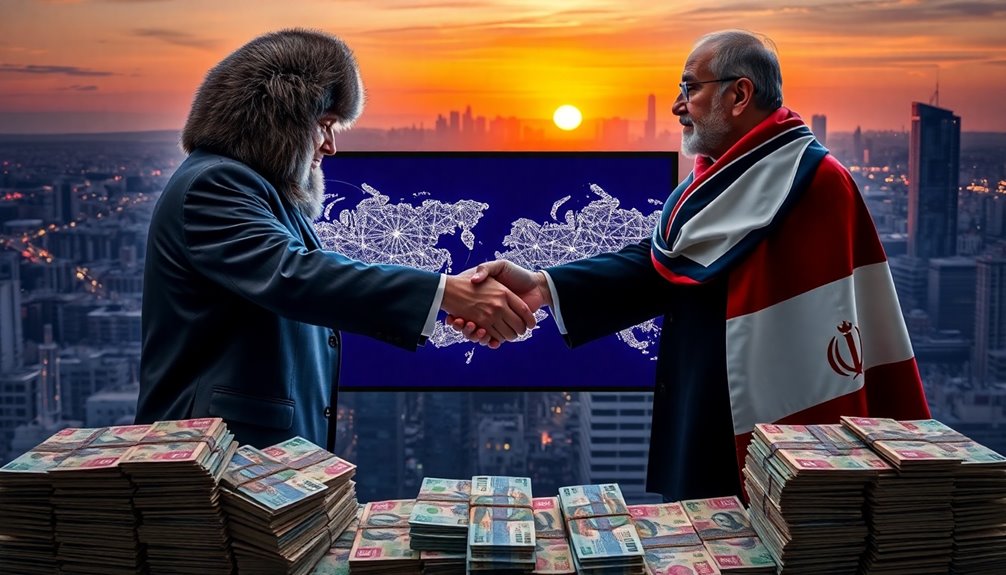
As Russia and Iran face increasing sanctions from the West, they've found common ground in forming a new financial alliance.
Both nations, heavily sanctioned, have cultivated a sense of solidarity that drives them to develop alternative financial systems. The impact of Western sanctions, like the SWIFT embargo, has pushed them to explore new economic pathways. Notably, Iran and Russia have linked their banking systems to facilitate trade outside the US financial system, allowing for greater cooperation.
They've adopted strategies from one another, especially in oil trade, employing tactics like disabling ship tracking and using shell companies.
This collaboration not only aims to evade sanctions but also ensures economic stability. Their status as top oil producers further strengthens this alliance, allowing them to navigate the challenging landscape of international finance together.
Legal Framework for New System
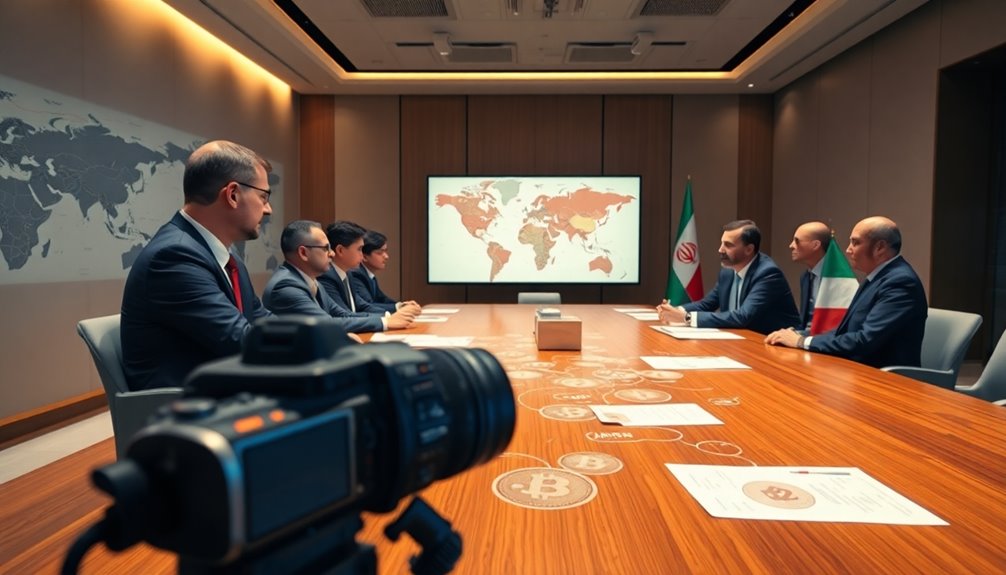
To establish a robust legal framework for their new payment system, Iran and Russia have entered into a significant agreement that links their national payment infrastructures.
This agreement enables direct transactions, bypassing SWIFT, which both countries have been excluded from due to sanctions. The Iranian and Russian Central Banks are actively involved, ensuring compliance with local regulations and facilitating cross-border transactions without intermediaries. Notably, this linkage allows Iranians to withdraw cash in rubles from Russian ATMs, enhancing the convenience of travel and trade between the two nations.
The system connects about 700 Russian banks and 106 foreign banks from 13 countries, enhancing international trade.
Additionally, the development of a gold-backed cryptocurrency aims to challenge the US dollar's dominance.
With regular audits and a commitment to transparency, this system is designed to adhere to international standards and protect financial data effectively.
Currency Exchange Rate Fluctuations

Currency exchange rates fluctuate due to a variety of factors that can impact the value of a country's currency.
Interest rates set by central banks play a crucial role; higher rates attract foreign capital, boosting demand for that currency. Economic data like GDP growth and employment rates also shape perceptions of economic health, influencing currency values. Additionally, currency fluctuations can significantly affect international trade and investment decisions.
Political stability is vital, as turmoil can deter investors and lead to depreciation. Inflation rates matter too—low inflation usually indicates a stable economy, while high inflation can erode purchasing power.
Finally, the balance between supply and demand directly affects exchange rates; increased demand or limited supply leads to appreciation, while the opposite can cause depreciation.
Cross-Border Transaction Enhancements
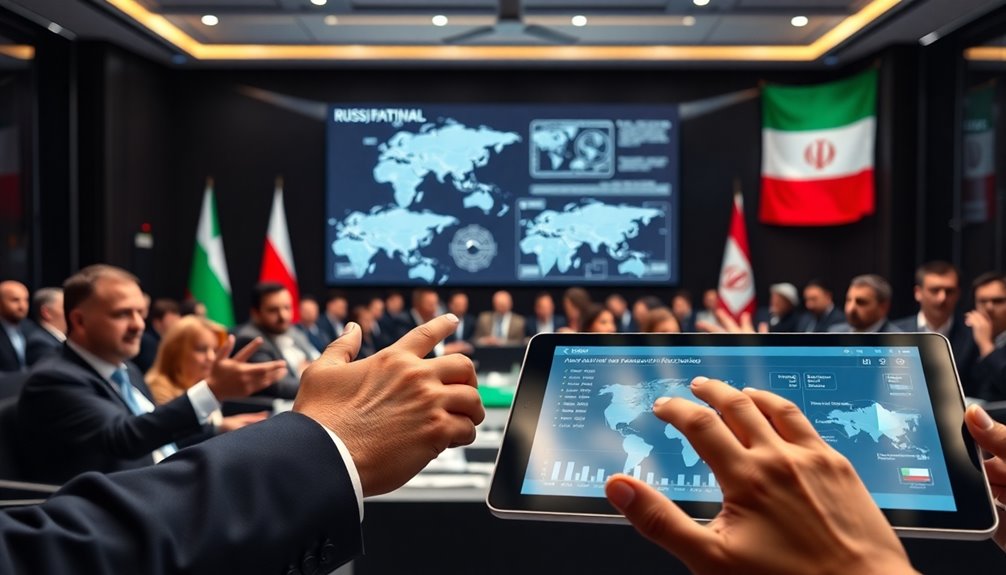
While global financial sanctions have complicated cross-border transactions for countries like Iran and Russia, both nations are actively enhancing their payment systems to facilitate trade.
They've linked their interbank communication systems, allowing Iranian banks to open Letters of Credit through Russian banks without relying on SWIFT. The new system involves around 700 Russian banks and several non-Russian banks from various countries. The System for Transfer of Financial Messages (SPFS) is expected to play a significant role in facilitating these transactions.
Iran's Sepam service is already helping them bypass SWIFT, enabling cardholders to access ATMs in Russia. Additionally, Iran plans to accept Russia's Mir card network, expanding its reach into new markets.
These enhancements are crucial for reducing reliance on the dollar-based financial systems and fostering smoother trade relations.
Geopolitical Tensions and Alliances
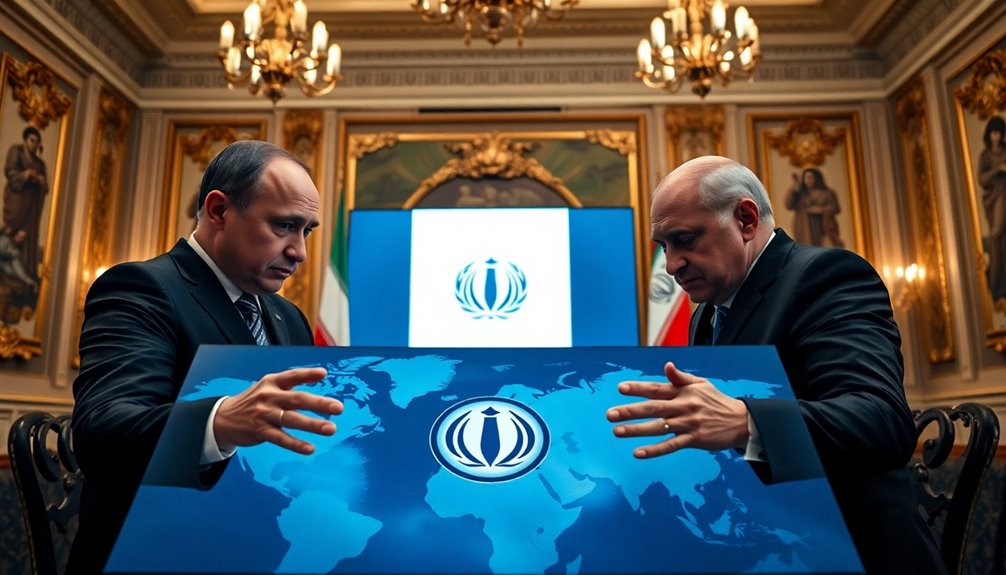
As Iran and Russia strengthen their partnership amidst escalating geopolitical tensions, they're not just focusing on military cooperation but also on economic resilience. Their Comprehensive Strategic Partnership Agreement aims to deepen ties in various sectors despite Western sanctions. By collaborating on counterterrorism and arms trade, both countries seek to bolster regional stability and secure their interests against Western influence. This partnership is seen as a way to combat international sanctions affecting both nations. Historically, this partnership builds on a 20-year foundation, showcasing a commitment to mutual support. With Russia emerging as Iran's biggest investor, the two nations are aligning economically to counteract shared vulnerabilities, particularly in oil markets. This alliance represents a pivotal shift toward a more Eastern-centric approach in their geopolitical strategies.
Long-Term Economic Collaboration Potential
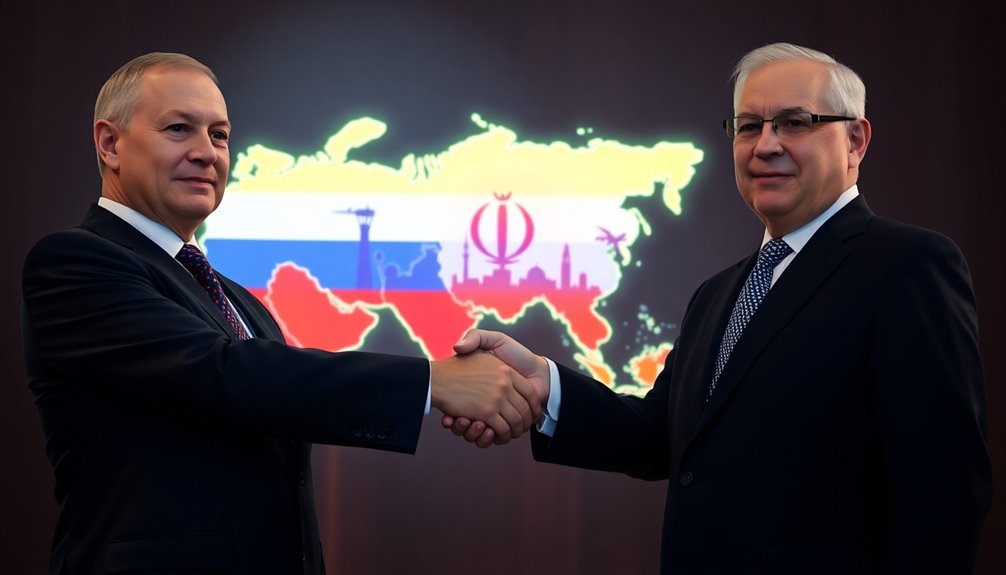
The potential for long-term economic collaboration between Russia and Iran is increasingly evident, especially as both nations seek to navigate the challenges posed by Western sanctions.
By boosting trade ties through a comprehensive strategic partnership treaty, they aim to increase trade volume and establish new transport routes, including shipping Russian natural gas to Iran. Trade and economic cooperation is identified as insufficient, with hopes for expansion.
Utilizing national currencies for transactions reduces reliance on the US dollar, while overcoming bureaucratic hurdles enhances economic cooperation.
Their focus on economic diversification and joint investments strengthens regional influence.
Additionally, linking their banking systems creates an alternative to SWIFT, fostering financial integration.
This collaboration not only bolsters economic resilience but also empowers both nations to mitigate the impact of sanctions effectively.
Frequently Asked Questions
How Will This New System Affect Global Trade Dynamics?
You'll notice that a new payment system can reshape global trade dynamics significantly.
By reducing reliance on traditional currencies and payment networks, it opens up opportunities for countries to engage in trade using their own currencies.
This shift might enhance regional cooperation while challenging Western financial dominance.
However, you should also consider the technical limitations and the need for broader international participation to ensure its effectiveness in the global marketplace.
What Technologies Support the New Payment System?
The new payment system relies on several key technologies.
You've got the Mir Payment System, which allows cardholders to make transactions in multiple countries.
The Shetab Payment System complements it, enabling seamless cash withdrawals.
Then there's the SPFS, facilitating secure interbank communication.
Technical teams from both countries are also collaborating to ensure smooth integration, allowing for efficient financial transactions.
These technologies collectively create a robust framework for secure and independent financial exchanges.
Are Other Countries Likely to Join This Alliance?
You might think countries would hesitate to join an alliance that challenges established financial systems, but many are likely attracted to economic incentives.
By reducing reliance on the US dollar and facilitating trade in local currencies, this new system offers lower transaction costs and increased financial independence.
Moreover, nations under Western sanctions could see this as a viable alternative, fostering deeper economic ties and enhancing regional integration in a changing global landscape.
How Will Consumer Protection Be Ensured in This System?
To ensure consumer protection in any payment system, you'll need clear guidelines set by regulatory authorities.
Compliance from connected banks is crucial, so they provide transparency about fees and transaction details.
Security measures like encryption and strong authentication are essential to protect your data.
Additionally, you'll benefit from consumer education through campaigns and support resources.
Lastly, an independent dispute resolution body ensures your concerns are addressed swiftly and fairly if issues arise.
What Are the Potential Risks of Using This Payment Method?
Imagine using a payment system that promises seamless transactions but carries hidden risks.
You might face issues like increased hacking vulnerability, facilitating illicit activities, and potential operational failures.
The lack of international monitoring could expose you to fraudulent transactions, while reliance on unstable banks raises concerns.
Plus, if this system triggers secondary sanctions, your financial dealings could become more complicated, making you rethink the safety and reliability of your transactions.
Conclusion
So, while Russia and Iran scramble to create a payment system that sidesteps SWIFT, you've got to wonder if they're really banking on a stable financial future or just a fancy way to dodge sanctions. It's almost charming how they think they can outsmart the global economy with a new currency dance. But hey, who wouldn't want to join forces over a cup of sanctions-free coffee? Here's to the irony of collaboration in a world full of economic rivalries!
